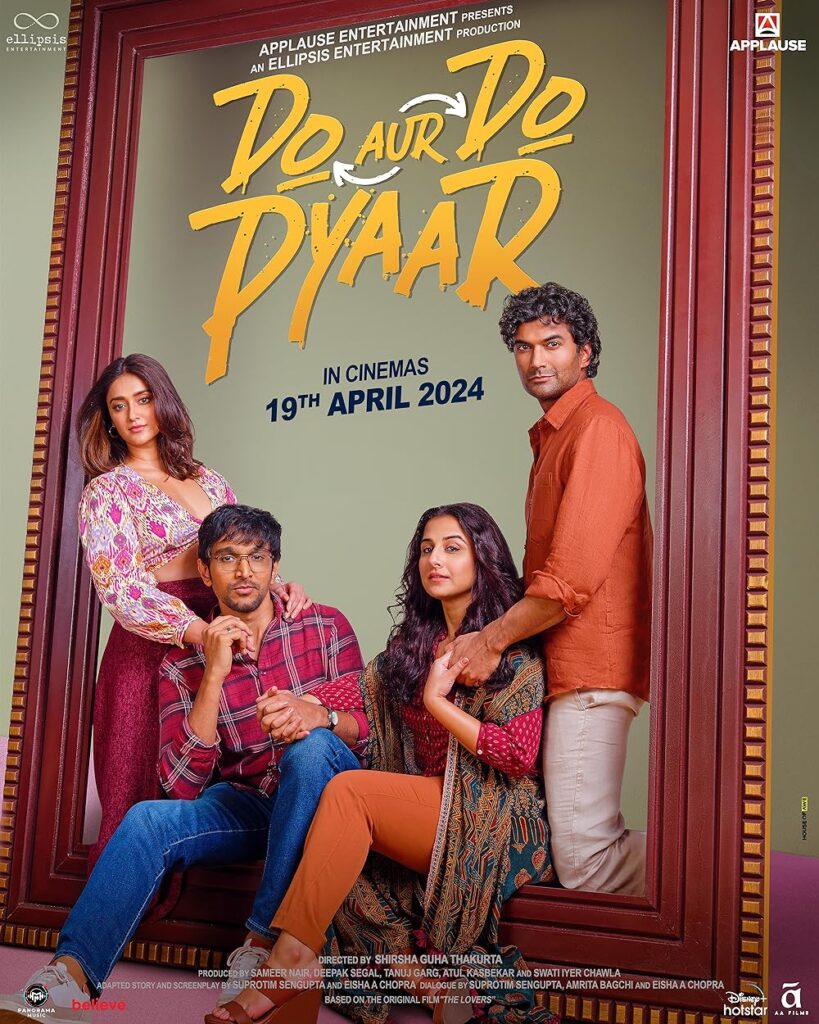Do Aur Do Pyaar
Introduction
This film has the ability to grow on you over a period of time! Love as we know is a complex emotion that is almost fleeting and wavered with every moment. This is almost reflective in the current relationships where being monogamous is indeed a rarity. Yet, the beauty of a relationship is that despite all the difficulties, you still show up everyday. But is that necessarily true at any given point of time? Love after marriage is an even further complicated dynamic particularly because we are taught that love eventually evaporates and what stays is companionship. And within this space, the concept of infidelity thrives given that love always finds a way to your heart irrespective of who the other person is. From my writeup, you can already make out how conflicting the concept of love is, and that it is a lot of hard work to maintain it consistently throughout a relationship. Which is why, the portrayal of this complex emotion is a complicated setup on celluloid has always attracted me, wherein I often try and use it as a case study(although it is fictional atleast onscreen). If Kabhi Alvida Na Kehna was a complex love story of two broken imdividuals, both married to different partners, it definitely did its bit in questioning the fact that what if you find your true love after marriage. This week’s release Do Aur Do Pyaar, an official adaptation of the English film The Lovers dwells on a similar concept of two married individuals out of love and resorting to infidelity only to fall in love with each other again. This reverse infidelity of sorts is what promised for an interesting dynamic, so then does Do Aur Do Pyaar manage to impress, let’s find out.
Story & Screenplay
An official adaptation of the English film The Lovers(that I have no reference of, given that I haven’t watched it), Do Aur Do Pyaar follows the story of a married couple, each resorting to infidelity until they fall in love all over again. The story here is a refreshing and nuanced take on a modern day marriage that often finds itself in an unusual space of being together while being separated. This, until love finds a way back leading to futher complications. It is a realistic take that has a tendency of growing on you even as you begin to ponder over the good times that love had to provide in your relationship respectively. The screenplay standing at 130 odd minutes is a compelling drama often laced with humour that lends a breezy stroke to a rather serious subject which is essentially meant for a matured viewing. The drama is understated and so is the humour wherein you do need to read between the lines to truly invest in the narrative and its characters. But if you intend to do that, the drama will slowly grow on you.
Adapted by Eisha Chopra, Amrita Bagchi and Suprotim Sengupta, the drama opens with some beautiful pictures of the monsoons of Mumbai, a city that itself is representative of being crowded wherein one is still lonely and longing for love. Amidst the hustle and bustle of the city and the mushy weather, you are introduced to the four principal characters starting with Kavya and Vikram who mildly indulge in PDA at a local Irani cafe. On the other side of the city, you are introduced to Nora and Ani practicing a scene together almost giving you an impression of their mad love for each other. You are further acquainted with the two couples as they plan to buy a house by the bae or casually indulge in flirtatious exchanges until there is a twist in the tale. The couple in focus is actually Ani and Kavya, married for quite sometime but on the verge of separation. You can notice the distance between the two literally through frames wherein they sit at either ends of the couch or sleep at far extremes on the same bed. All you know is that all is not well, this until a family tragedy brings the duo together thereby further complicating their lives given that each of them is having a secret affair oblivious of the other knowing about it.
The proceedings are compelling coupled with a frothy vibe that doesn’t allow to weigh down the drama. There is a sense of humour lacing the narrative which is particularly true in the funeral setup following a family tragedy. The two cultures mildly colliding wherein you are further acquainted with the characters of Ani and Kavya and how their love story had started, results in quite an endearing and fun watch. The sense of awkwardness at coming in close contact with the family especially having runaway for love at one point makes for an interesting dynamic, even as the family remains oblivious of their now strained relationship(with the duo oblivious of their respective affairs). But as they say, a fresh setting that evoke a sense of nostalgia! And this was true given that love makes a way back in their lives in a true case of reverse infidelity, a moment wonderfully created in Hotel Elephanta with the DJ resorting to a perfect dance number ‘Bin Tere Sanam’.
With love comes intimacy and its share of complexity and that forms the crux of the second hour. Here I must say that the proceedings get a little repetitive with a little lag in the screenplay. Also the theme that started with the monsoons of Mumbai(representing the strained relationship between Ani and Kavya) and slowly making its way to Diwali(marking a renewed start in their relationship) could have briefly been depicted by the vibe of the city, a little more through its frames just like the start of the film wherein Mumbai as a city could have played a parallel character and a silent onlooker in the relationship of Kavya and Ani. Yet, the exploration of the complexities of intertwined relationships is well depicted leading to a bit of a showdown in a slightly subdued fashion. The end was quite realistic and perfectly symbolized the relationship quo of the protagonists thereby summing up a screenplay that is very well written.
Dialogues, Music & Direction
The dialogues here are profound and realistic while being laced with humour. But the lines depict the vibe of the drama perfectly well whether it is differentiating the crux of the relation of the protagonists with the previous generation, or simply depicting a sense of being carefree and unapologetic in the modern day setup. The music is as breezy as the drama almost to be enjoyed on a hot summer afternoon to the strings of the guitar. The BGM is soft yet impactful, engulfing you in the complex dynamics of the protagonists while enhancing the underlying impact of the drama. The cinematography is top notch featuring numerous frames wherein each frame has a story to tell – be it the wide shots depicting the distance between the couple or the newfound love in the lives of Kavya and Ani or even the frames depicting the greyish landscape of Mumbai. Clearly, there has been a lot of thought given to the frames of the film. The editing is quite good although a little lag in the second half could have ensured an even more crisper watch. Director Shirsha Guha Thakurta in her debut really manages to impress with her sensibilities in handling a rather sensitive and complex subject. Her ability to create a world filled with intertwining relationships and adding conflicted characters to the setup was simply a treat to watch even as she ensured to keep the proceedings light and frothy while never resorting the drama to be preachy. The direction is excellent here.
Performances
The performances are simply brilliant by the entire cast. Priti Shroff, Veenah Nair and Hitha Chandrasekhar have their moments to shine. Rekha Kudligi and Thalaivasal Vijay are top notch performers and both manage to impress. Ileana D’Cruz as Nora looks pretty and does a wonderful job in expressing her vulnerabilities. Sendhil Ramamurthy as Vikram delivers a rather charming and dignified performance while bringing in his share of emotions in a rather subtle manner. Pratik Gandhi as Ani is a revelation! He is pitch perfect in his character who is dealing with his own set of issues while being broken from within and subconsciously longing for love. These were conflicted and complex emotions to portray, and he absolutely nails his character and how! Vidya Balan as Kavya is such a natural here. She has a range of emotions to play with and she never loses a single beat in her character. Both Vidya and Pratik share affectionate chemistry that really makes you want to root for them even as they tend to play ‘Hide And Seek’ with each other while occasionally indulging in ‘Chicken 65′(wink wink). These were two sets of brilliant actors that literally exchanged verbals so beautifully while also respecting each other’s spaces. Two exceptional performances lace this wonderful narrative here.
Conclusion
Do Aur Do Pyaar is a refreshing, nuanced and a realistic take on a modern day monogamous marriage that makes for an incredible watch. Available in a theatre near you.




